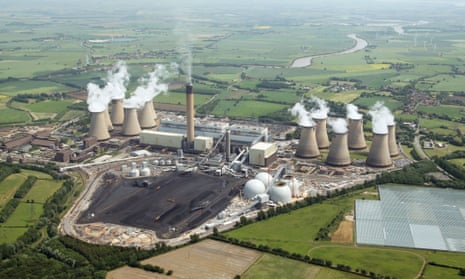Norway’s parliament has formally endorsed the move to sell off coal investments from its $900bn sovereign wealth fund, the world’s biggest. It is the largest fossil fuel divestment yet, affecting 122 companies across the world, and marking a new success for the fast-growing and UN-backed climate change campaign.
A new analysis said the fund would sell off over $8bn (£5bn) of coal-related investments as a result.
The biggest single sell-off from Norway’s fund will be the UK utility SSE, in which the fund holds $956m of shares. The fund is also set to sell its $49m stake in Drax, which runs the UK’s biggest coal-fired power station.
Other major energy companies identified in the analysis by German and Norwegian NGOs are Germany’s E.ON ($685m) and RWE ($320m) and the Danish company Dong ($30m), which is often associated with wind energy but has a significant coal business.
Sweden’s Vattenfall and Italy’s Enel are also set to be affected by the coal ban as are 35 groups in the US, including Duke Energy ($434m). A dozen coal-related companies on China are set to lose their Norwegian investment, as are eight in Japan and five in Australia.
The decision to divest Norway’s $945m fund from coal assets was made on 27 May, when an agreement between political parties was reached. It was formally passed by a parliamentary vote on Friday. Svein Flaatten, of the governing Conservative party, said coal investments were both a global warming risk and financial risk. A global deal to cut carbon emissions at a crunch UN summit in December could leave some fossil fuel reserves unburnable and worthless.
The fossil fuel divestment campaign seeks to persuade investors to dump stocks on the basis that current reserves of coal, oil and gas are already several times greater than could be safely burned. It has seen a string of successes, including last Friday’s commitment from French financial services giant Axa sell to $560m of coal-related investments.
The Guardian’s Keep it in the Ground campaign is calling on the world’s two largest medical charities – the Gates Foundation and the Wellcome Trust – to divest their endowments from fossil fuels. The Guardian Media Group pledged to divest its own $1bn fund from all fossil fuels in April.
Norway’s finance committee decided the nation’s fund, known as the Government Pension Fund Global (GPFG), should sell stakes in companies for which mining or burning coal makes up more than 30% of their business, or have projects in development that would tip them over the 30% threshold. The measures are to be implemented on 1 January 2016.
The NGO’s Urgewald, Greenpeace and Framtiden applied these criteria to the more than 9,000 companies owned by the GPFG to create their list of 122 companies. It calculates the combined value of the holdings to be sold at $8.7bn. The GPFG is funded by revenues from Norway’s large oil and gas production.
“This is the biggest divestment from coal in history and it should pave the way for other investors and countries to follow suit,” says Truls Gulowsen, head of Greenpeace in Norway.
“The significance of the Norway decision is that, because of their size and reach, this will act as a major signal for other investors to follow. This will certainly create a wave,” said Mark Campanale, founder of the Carbon Tracker Initiative, which has pioneered analysis of the financial risks of fossil fuels.
Norway’s finance ministry is reported to have calculated that $9bn-$10bn of investments would be affected by the divestment, suggesting that the NGO analysis may be an underestimate.
Some major mining companies, such as Anglo American and BHP Billiton, have very large coal reserves and production but are not affected by the new GPFG rules. This is because coal makes up less than 30% of their total mining operations across the world.

Comments (…)
Sign in or create your Guardian account to join the discussion